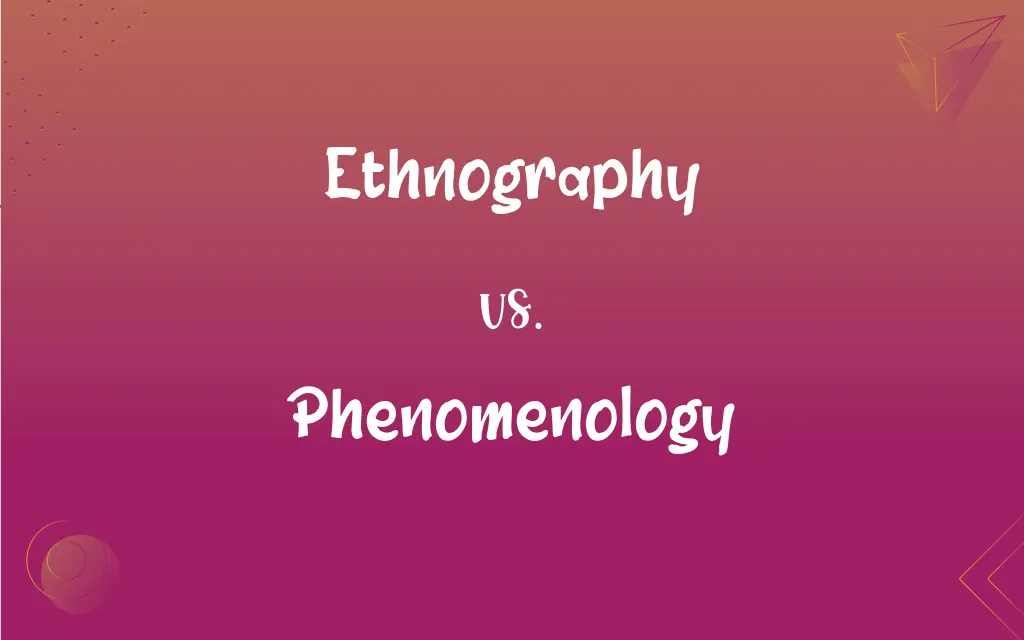Ethnography vs. Phenomenology: What's the Difference?
Edited by Aimie Carlson || By Harlon Moss || Published on November 13, 2023
Ethnography is the study of cultures through observation and interaction, while phenomenology examines individual experiences and consciousness.

Key Differences
Ethnography focuses on the systematic study of people and cultures, typically through direct observation, interviews, and participation. Phenomenology, on the other hand, delves into the study of individual experiences and the nature of consciousness.
Ethnography often involves extended fieldwork, where researchers immerse themselves in a community or culture to gather data. Phenomenology emphasizes introspection, using in-depth interviews or personal narratives to explore individual perceptions and feelings.
Ethnography aims to understand and describe a culture or social group from an insider's perspective. Phenomenology seeks to uncover the essence of experiences and how individuals perceive and understand their world.
Ethnography is commonly used in anthropology, sociology, and other social sciences to explore cultural norms, values, and behaviors. Phenomenology finds its roots in philosophy and is used in psychology, education, and health sciences to understand personal experiences.
Ethnography often takes a relativistic approach, acknowledging multiple realities within a culture. Phenomenology, conversely, is grounded in the idea that there are essential structures of experience that can be explored and understood.
ADVERTISEMENT
Comparison Chart
Primary Focus
Study of cultures through observation and participation.
Study of individual experiences and consciousness.
Research Methods
Fieldwork, participant observation, interviews.
In-depth interviews, personal narratives, introspection.
Purpose
Understand and describe a culture from an insider's view.
Uncover the essence of personal experiences.
Common Applications
Anthropology, sociology, cultural studies.
Psychology, philosophy, education, health sciences.
Philosophical Foundation
Relativistic approach acknowledging multiple cultural realities.
Exploration of essential structures of experience.
ADVERTISEMENT
Ethnography and Phenomenology Definitions
Ethnography
The descriptive study of cultural groups or systems.
His ethnography on urban youth subcultures won several awards.
Phenomenology
Research focusing on the subjective experiences and interpretations of individuals.
The phenomenology study highlighted various interpretations of the same event.
Ethnography
A research method studying cultures through direct observation.
Through ethnography, she was able to understand the rituals of the remote tribe.
Phenomenology
Investigation of experiences as they are perceived.
Phenomenology is concerned with lived experiences, not external interpretations.
Ethnography
A detailed written account of a particular culture based on fieldwork.
The ethnography captured the essence of village life.
Phenomenology
A philosophical approach emphasizing individual perception and consciousness.
Through phenomenology, we can grasp the essence of sorrow.
Ethnography
Systematic recording of human cultures.
Ethnography provides insights that surveys often miss.
Phenomenology
The study of the structures of consciousness and experience.
Phenomenology offers a deep dive into how people perceive the world.
Ethnography
Fieldwork undertaken to describe a particular culture or community.
The ethnography of the fishing community took years to complete.
Phenomenology
A philosophical movement considering direct experiences and intuition.
Phenomenology challenges us to rethink our everyday experiences.
Ethnography
The branch of anthropology that deals with the description of specific human cultures, using methods such as close observation and interviews.
Phenomenology
A philosophy or method of inquiry concerned with the perception and experience of objects and events as the basis for the investigation of reality.
Ethnography
A text produced using such methods.
Ethnography
(anthropology) The branch of anthropology that scientifically describes specific human cultures and societies.
Ethnography
An ethnographic work.
Ethnography
That branch of knowledge which has for its subject the characteristics of the human family, developing the details with which ethnology as a comparative science deals; descriptive ethnology. See Ethnology.
Ethnography
The branch of anthropology that provides scientific description of individual human societies
FAQs
Why is fieldwork crucial for ethnography?
It allows researchers to immerse themselves in the culture, ensuring an insider's perspective.
What is the main focus of ethnography?
Ethnography focuses on studying and describing cultures through direct observation and participation.
Can ethnography be applied to any community?
Yes, ethnography can be applied to study any group, from remote tribes to urban communities.
What is the primary philosophical basis for phenomenology?
It believes there are essential structures of experience that can be explored and understood.
What tools do ethnographers often use during their research?
They use tools like interviews, notes, videos, and sometimes even participate in cultural activities.
How objective is ethnographic research?
While aiming for objectivity, ethnography acknowledges the researcher's influence and the multiple realities within cultures.
Is ethnography limited to cultural studies?
Primarily used in cultural studies, it's also applied in sociology, design, and business research.
How does phenomenology differ from other research methods?
Phenomenology centers on individual experiences, perceptions, and consciousness.
How does phenomenology contribute to psychology?
It provides insights into individual experiences, which can inform understanding of behaviors and emotions.
How are phenomenological findings typically shared?
Through detailed narratives or descriptions emphasizing personal perceptions and experiences.
Why is introspection significant in phenomenology?
It aids in understanding individual perceptions, feelings, and consciousness.
How long does ethnographic research typically last?
It varies but often involves extended periods, sometimes years, to deeply understand the culture.
Does phenomenology believe in an objective reality?
Phenomenology focuses on subjective experiences, emphasizing individual perceptions over objective realities.
What's a common critique of phenomenology?
Some argue its emphasis on introspection might not provide a comprehensive view of experiences.
Why is phenomenology considered philosophical?
It originated in philosophy and addresses the fundamental nature of experience and consciousness.
What's the relationship between phenomenology and existentialism?
Both are philosophical approaches, with phenomenology influencing existentialism's focus on individual existence and experience.
Can ethnography inform policy-making?
Absolutely, as it offers deep insights into communities which can guide policy decisions.
Can anyone conduct ethnographic research?
While anyone can undertake it, effective ethnography requires training and skill to capture nuanced cultural insights.
Is phenomenology solely qualitative?
Primarily qualitative, some approaches combine it with quantitative methods for comprehensive insights.
How is data presented in ethnography?
Often as narratives, stories, or detailed descriptions of cultural practices.
About Author
Written by
Harlon MossHarlon is a seasoned quality moderator and accomplished content writer for Difference Wiki. An alumnus of the prestigious University of California, he earned his degree in Computer Science. Leveraging his academic background, Harlon brings a meticulous and informed perspective to his work, ensuring content accuracy and excellence.
Edited by
Aimie CarlsonAimie Carlson, holding a master's degree in English literature, is a fervent English language enthusiast. She lends her writing talents to Difference Wiki, a prominent website that specializes in comparisons, offering readers insightful analyses that both captivate and inform.

































































